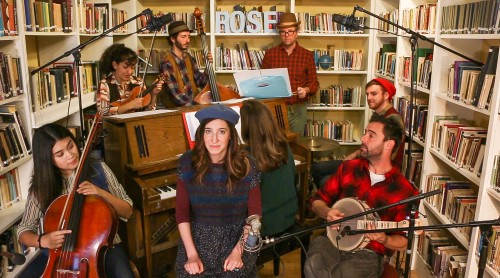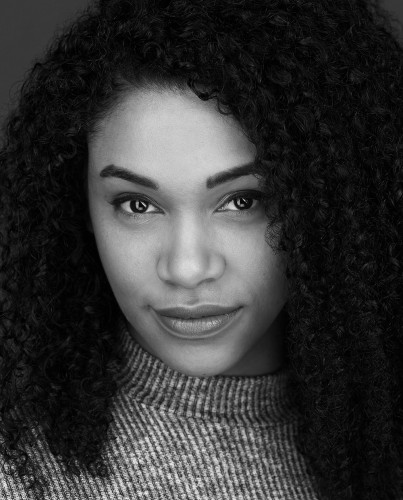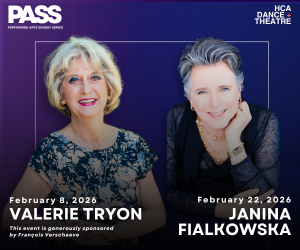 In the new year, one of the most exciting shows coming up is the world premiere by Soulpepper Theatre Company of Rose, a new musical inspired by Gertrude Stein’s first children’s book, The World Is Round. Yes, that Gertrude Stein, who wrote “A Rose is a Rose is a Rose.” A real Rose, a little girl neighbour of Stein’s, had inspired her to write the story, and when author Margaret Wise Brown (Goodnight Moon) approached Stein on behalf of new publisher Young Scott Books in 1938 to see if she might be interested in writing a children’s book for them, she sent this manuscript. With clean-cut yet whimsical illustrations by Clement Hurd (also of Goodnight Moon) to give a tangible reality to the whimsical yet deeply philosophical story of a young girl trying to make sense of her world, the book became a classic that was reprinted several times, although it isn’t as well known today.
In the new year, one of the most exciting shows coming up is the world premiere by Soulpepper Theatre Company of Rose, a new musical inspired by Gertrude Stein’s first children’s book, The World Is Round. Yes, that Gertrude Stein, who wrote “A Rose is a Rose is a Rose.” A real Rose, a little girl neighbour of Stein’s, had inspired her to write the story, and when author Margaret Wise Brown (Goodnight Moon) approached Stein on behalf of new publisher Young Scott Books in 1938 to see if she might be interested in writing a children’s book for them, she sent this manuscript. With clean-cut yet whimsical illustrations by Clement Hurd (also of Goodnight Moon) to give a tangible reality to the whimsical yet deeply philosophical story of a young girl trying to make sense of her world, the book became a classic that was reprinted several times, although it isn’t as well known today.
As soon as I heard about the project to turn this unique children’s story into a musical I wanted to know more and reached out to Soulpepper to get in touch with the creators, well-known composer and music director Mike Ross (music and book) and writer/actor Sarah Wilson (lyrics and book).
What follows is an absorbing conversation I had with Wilson, leaving me even more intrigued than before about the show itself.
WN: How or why did Gertrude Stein’s rare children’s book The World is Round become the inspiration or starting point for your new musical?
SW: Mike and I had talked about making something together, specifically adapting something for all ages, but we hadn’t found the right thing yet. We had a couple of false starts on other projects before I came across an excerpt from The World is Round online and was drawn enough to it that I ordered it. I thought it was weird and wonderful and musical and so I showed it to Mike, who agreed.
You have worked together before at Soulpepper, but what brought you together to create this piece?
Yes, we were part of the first Academy, so we’ve known each other a long time now. A really great thing about Soulpepper is that you kind of swim around one another for years and get to know each other and find creative partnerships in a really organic way. So we’d acted in shows together and we’re good friends, but it wasn’t until years later that we started batting ideas around to create something.
Rose is listed on the Soulpepper website as a “project ImagiNation commission.” Can you tell me about this program and how Rose will fit with its mandate?
It’s a commissioning project for new Canadian work. Practically, it means that we get resources (time, space, people, money) to create and workshop, and potentially a full production. The support let us do the concert two years ago, which was invaluable, and has let us be ambitious. We’re free to write a bigger show for more performers, hire a choreographer so we can have full production numbers, test material out both in-house and publicly…it gives you practical support to dream.
Have you stuck closely to the story of Rose in the book, and her journey to understand and feel comfortable in the world, or have you made changes/additions to make it more contemporary or Canadian?
Anybody familiar with the book will certainly recognize it as the source, but we’ve created a more active, accessible narrative. It’s based on the book, but expanded. Rose is set in a little mountain town that’s familiar but not naturalistic, so it’s got that kind of fairy-tale quality. We don’t specifically reference Canada, but there’s a lot of maple flavour. Some loggers. Some plaid. A certain kind of small-town snow-globe feel that I associate with home.
The style of Gertrude Stein’s writing in the book can seem too adult as it is so abstract and without much punctuation, and yet it also sounds – when read aloud – very like the way a child tells stories to other children. Have you kept this style of the text in your book and lyrics?
We’ve used Stein’s text in many ways in Rose. Some of the more typical Stein poetry – the stream of consciousness, fantastic rhythmic stuff is how Rose thinks to herself, her brain chatter when she’s all alone. She’s isn’t outgoing, she knows she’s different somehow from other kids, but she’s got an incredibly rich inner life and that kind of runaway-train kid-think is best expressed by Stein. Other characters express themselves differently. There’s a town full of people who love Rose, but don’t think like her or talk like her. Some are more straightforward, like Rose’s best friend Willie, so while his text and lyrics aren’t direct pulls from the book, they use bits of Stein, an idea or a phrase as a jumping-off point. Other characters have their own eccentricities and rhythms.
Lyrically, I’ve also used a pretty simple vocabulary. Stein has a famous quote where she says “I like words of one syllable” and although this wasn’t a conscious choice initially, I’ve found that what we’re trying to do is best served by simple language. Big ideas in little words, and sometimes arranged in unusual ways.
Can you tell me about the process of tackling this material and adapting it into a musical that could appeal to all ages and yet still have the flavour and philosophy of Gertrude Stein’s original story?
Flavour is a good word to describe it. I love the energy and strange sense of Stein’s work, but we didn’t want to make an avant-garde musical. Rose is different than anything I’ve seen, but it’s not abstract, it’s not remote. You don’t require knowledge of Stein or a degree in literature or anything like that to enjoy it.
We both really responded to this story of a nine-year-old girl trying to figure out who she is, asking big questions that sometimes she’s not even sure she understands. Nine is such an important age. It’s so young, but it’s also a time that your mind starts to really zoom in and out on the world. You’re grappling with everyday things, but underneath that there are much larger questions lurking. And they’re questions that can last a lifetime.
Our Rose is warm and big-hearted and really funny. I guess in writing it I check in a lot with my own taste and sensibilities. I love challenging, off-centre work, but not in a cerebral way. I respond to it viscerally – I find it exciting, and so it’s a process of trying to wrangle that energy and marry that to our own ideas and desires to create something new. When I see a show, I want heart and brains and humour. And I want to feel welcome. I want to feel people trying to express something that’s difficult to talk about. And I think that’s what we’ve done.
What sort of balance is there between spoken dialogue and song? Is there a special way words and music work together on this show that is different from or similar to other shows you have created or worked on?
It’s not a sung-through show – there are spoken scenes as well as songs. There’s a ton of variety in Rose. In some ways it’s a very traditional story, beginning with “Once upon a time,” but then from there, we go everywhere.
Has the three-year development process, including the concert presentation in 2016 given you any surprises in rehearsal or in front of its first audiences? Has the show changed during the process from what you thought it would be?
We started this process very open-minded. We didn’t have an end goal of what we thought it would or should be, but it’s been amazing to see it grow. Sometimes we find files of writing or MP3s from years ago and it’s so neat to see how it’s evolved.
The concert was especially useful. Since then, the major part of our process has been book work, which then necessitates a lot of song rewriting, so there’s a ton of new material since then. But it was very encouraging in that I could see that even though there was a lot of work to do, there was a strong heartbeat.
Will the designs by Lorenzo Savoini for the show be inspired or influenced by the book’s famous Clement Hurd illustrations?
Yes! They’re such beautiful illustrations, so that influence is absolutely there. Lorenzo’s created a gorgeous container for our story to unfold, and that container is that terrific pink of the pages of The World Is Round. Both the illustrations and Lorenzo’s design live in that sweet spot between childlike and sophisticated. The first time I saw Hurd’s drawings they struck me as both unlike anything I’d ever seen and at the same time totally familiar. The design lives in that space, too.
Mike and I have handed Lorenzo, our costume designer Alexandra Lord and our director Gregory Prest a ton of challenges, and what I’ve seen so far has been so inventive and enchanting. I think it’ll be a real pleasure to spend time in the world they’re creating.
If you had to sum up the show in one sentence for prospective audience members what would you say?
This is a grown-up show for kids and a kids show for grow-ups – it’s beautiful, funny and unusual and you’ll leave humming.
That’s kind of a cheat sentence, but there it is.
(For a first taste and glimpse of the musical go to the Soulpepper YouTube channel to hear the song A Name Means a Lot performed by Hailey Gillis. Rose opens at Soulpepper on January 17 and has already been extended to February 24.)
Looking Back (And Immediately Ahead)
Fantasticks: For one night only, on October 30, Tom Jones and Harvey Schmidt’s sweet-yet-tart chamber musical The Fantasticks came back to life in a delightful semi-staged concert at the Stratford Festival as part of the Forum series. I know the music well, but had never seen the show live – although it is famous as being the longest-ever running musical off-Broadway. It was fascinating to see this version which was true to the original but subtly revised for 21st-century sensibilities, including changing the two fathers of the original to two mothers. In the role of El Gallo, the mysterious character who acts as narrator and mastermind of the plot, TV star and former Stratford company member Eric McCormack led the cast with great warmth and style.
Red Sky: Another highlight of the season so far for me was Red Sky Performance’s most recent dance theatre creation, Trace, which premiered at Canadian Stage in early November sweeping audiences to their feet. A powerful and inspiring envisioning of Anishinaabe sky stories, this production is, in my opinion, the best yet from Red Sky. All the elements: Jera Wolfe’s athletic sculptural choreography, the atmospheric music of Eliot Britton and projections by Marcella Grimaux, are reaching for new heights and attaining new levels of artistry through their combination in the service of specific, yet universal, storytelling.
Coming up in December: All the usual seasonal favourites including Ross Petty’s annual panto (this year The Wizard of Oz), the National Ballet’s Nutcracker, and many versions of A Christmas Carol are on tap. On December 8, there is also a first public workshop of a new family-oriented musical version of Jack & the Beanstalk by classically trained Canadian composer William Lavigne. Inspired by the traditional musicals of Gershwin, Bernstein and Rogers and Hammerstein, Lavigne says that he really wants to “present a new theatre piece that is musically accessible and suitable for all ages to enjoy, based on a story that is relatable to everyone.” Benoit Boutet, Gabrielle Prata, and Adi Braun lead the cast in this first public outing of the in-development Jack & the Beanstalk at the Royal Conservatory’s Temerty Theatre.
MUSIC THEATRE QUICK PICKS
DEC 1 TO JAN 6: Young People’s Theatre. Mary Poppins.
DEC 7, 7PM: Brampton Music Theatre. Mary Poppins (full-length version). As the sequel to the original movie takes over cinemas, two productions of the recent stage version of Mary Poppins (book revised by Julian Fellows) are playing in time for the holidays. YPT’s shortened version, ideal for young children, this year directed by well-known performer Thom Allison, has excellent word of mouth
DEC 1, ONWARDS: Mirvish Productions. Come from Away. If you haven’t seen it yet, treat yourself and loved ones to this ridiculously good and truly heartwarming Canadian musical soon transferring from the Royal Alex to the Elgin Theatre and with a run extended to at least June 2019
DEC 5 TO 16: Civic Light Opera Company. Scrooge, the Musical. Music, lyrics and book by Leslie Bricusse. As a longtime fan of Leslie Bricusse’s lyrics for Victor/Victoria I am very intrigued by this version of A Christmas Carol.
DEC 8 TO 30: National Ballet of Canada. The Nutcracker. One of the best introductions to the ballet for children, and for many families an annual outing; possibly more popular than ever now that a new film version has just appeared.
JAN 4 TO 27: Tarragon Theatre. Kiviuq Returns: An Inuit Epic. Music, drumming, dance and storytelling combine in a new modern evocation of the legendary figure of Kiviuq: hero, seeker, wanderer by the Qaggiq Collective; all in Inuktitut.
JAN 17 TO 27: Mirvish. The Simon and Garfunkel Story. This immersive concert-style presentation of a biographical walk-through of the musical partnership, with large-scale screen projections and a full band, is said to be a must-see for fans and should be a good fit for the intimate CAA Theatre.
JAN 29 TO FEB 9: Tapestry Opera. Hook Up. Another exciting world premiere from Tapestry, this time dealing with the very current issue of consent in a university setting. With a young cast of classically trained singer/actors, a contemporary book by Julie Tepperman and score by Chris Thornborrow, word is that Hook Up is part opera/part musical.
Toronto-based “lifelong theatre person” Jennifer (Jenny) Parr works as a director, fight director, stage manager and coach, and is equally crazy about movies and musicals.




